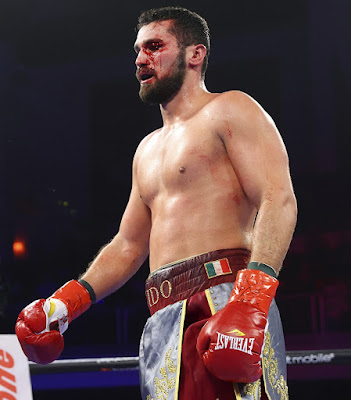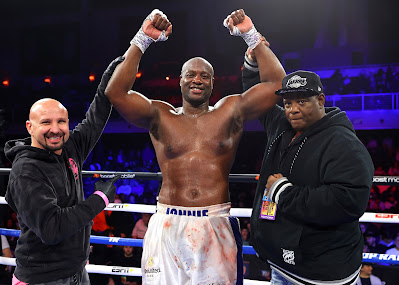Every now and then boxing rescues itself from the abyss and
reminds its fans that there are actual adults in the room making decisions. Now
these occurrences aren't necessarily frequent, but it's worth pointing out when
the sport does the right thing, even when it doesn't have to. Such a situation
transpired last Saturday in the Guido Vianello-Jonnie Rice
fight.
Vianello entered Saturday's fight as an undefeated heavyweight
(10-0-1) and the one with the Top Rank contract. The Italian Olympian hadn't
fully impressed in the early portion of his pro career, but still, he was
signed to one of the biggest promoters in the sport for a reason.
Rice was a late-replacement opponent and while many thought he had
a decent chance of beating Vianello if he was in good shape, his lack of
self-confidence, inconsistent motivation, and out-of-the ring habits have at times sabotaged
his career. Rice had a professional record of 15-6, but with 10
knockouts. He also had a reputation of being a strong sparring partner, working
with Luis Ortiz, Joe Joyce, Michael Hunter, Filip Hrgovic, Jared Anderson, and
Efe Ajagba among many other notable heavyweights.
Vianello won the first five rounds of Saturday's fight with ease.
Pumping a jump and pressing the action, Vianello's activity level was much
greater than Rice's and although Vianello didn't land many signature blows in
the fight, he at least was working; Rice, for whatever reason, was reluctant to
let his hands go.
But in the sixth, the fight changed. Rice landed a blistering
counter right hand that shook Vianello. More importantly, right after the punch
landed, Vianello started to bleed profusely. There was now a large and deep
horizontal cut directly above his left eye.
Vianello was able to complete the round, but in the beginning of
the seventh the cut again opened up. Referee Benjy Esteves halted the action
and had Vianello examined by the ringside physician. Vianello was in bad shape
and the doctor made the wise decision in recommending stopping the fight.
 |
| Vianello's cut above his left eye Photo courtesy of Mikey Williams |
But then things started to get strange. After waving the fight off, Esteves instructed the judges to score the round, meaning, that the fight would go to the scorecards. He believed that the cut had been caused by a head butt and notified the judges accordingly. Viewers watching the broadcast didn't observe the type of head butt that would make such a gash, nor did the ESPN replays show such a moment. And what was particularly unusual about Esteves' ruling was that he didn't appear to notify the judges of the head butt in the sixth round directly after it happened or in the break between rounds, which are the usual standard practices when these cuts occur.
Now, if the cut was ruled to be caused by a punch, then Rice would
have won by technical knockout, but if it was deemed to be caused by a head
butt, then the fight would have gone to the scorecards, where Rice would have
been down at that point in the match and would have lost. So, as it
initially stood, Rice looked like he was about to be screwed by Esteves, which as
the B-side is something that certainly happens in the sport.
But we're just beginning to get weird here. Within moments after
instructing the judges to score the round, Carl Moretti, the Vice President of
Operations for Top Rank, was talking with Esteves in the ring and mentioned
that the ESPN broadcasters believed a punch had caused the cut and not a head
butt (this exchange was captured on the broadcast). Then Dan Gustafson, the
Executive Director of the Oneida Indian Nation Gaming Commission (the jurisdiction
for Saturday's fight), suggested that Esteves might want to consider using
replay to assess whether a head butt or a punch caused the cut.
All of this was very ad hoc, with there not being firm rules about
when the commission could and would use video replay. And to Esteves' credit,
he listened to what was being said, left the ring and marched over to the ESPN
broadcast table to review the replay angles. Within a few brief minutes, he had
seen enough to change his initial ruling, thereby giving Rice the knockout
victory.
 |
| Jonnie Rice belatedly getting the victory Photo courtesy of Mikey Williams |
Two factors contributed to this unusual and yet satisfying conclusion. Carl Moretti's fighter in the bout was Vianello. Top Rank didn't have a long-term promotional contract with Rice, and it was to Top Rank's benefit (in theory) to have Vianello declared the winner. However, Moretti understood the optics. It did no justice to Rice, to the sport, to the commission or to the legitimacy of the whole enterprise for Vianello to win in that manner. The integrity of the sport trumped Top Rank's parochial interest in Vianello. Moretti was under no obligation to suggest to Esteves that a punch may have caused the cut, but he believed that it was the right thing to do; and it was.
Also, credit must be given to Esteves for his desire to get it right. Esteves has been a solid ref for decades,
but he got the initial call wrong. Refreshingly, he didn't double down on his
mistake and that's certainly commendable. All referees will err, but Esteves understood
that getting it right was more important than his ego. Yes, he had an off night,
but he didn't compound his mistake by ignoring contradictory evidence.
Ultimately, justice was done and Rice got his deserved win. The right decision was made, but there were still some icky moments in getting to the proper outcome that need to be addressed moving forward, with two questions in particular:
Ultimately boxing needs to get its act together. Every major sport uses replay for specific prescribed scenarios. And boxing could do the right thing by mandating replay for specific instances where there is doubt (knockdown vs. no knockdown calls or cuts caused by punches or head butts to name two).
The powers that be got things right on Saturday and they should be congratulated for their conduct, but it would have been much easier for everyone involved if these types of rules had been codified by the commission. Boxing doesn't HAVE to be retrograde as a sport; it just often chooses to be.
This issue is too important to leave it up to every jurisdiction or Podunk commission throughout the land. It's time to take some power away from these fiefdoms. Let's make a simple rule: If you want to hold world-class boxing, then you need to have replay. And then prescribe how and when it should be utilized.
Not every problem in boxing is intractable. In America, the ABC has the power to codify the utilization of replay. It's time to act like adults and gather the relevant parties together to make universal rules for replay's application. We should not have to count on a beneficent promoter or a forward-looking executive director to save an event. It's time to grow up.
No comments:
Post a Comment